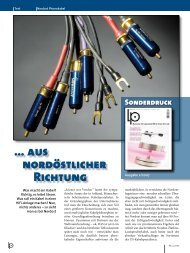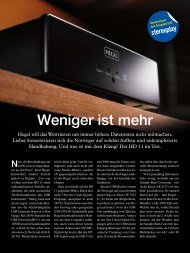Reinventing Audio - Hegel
Reinventing Audio - Hegel
Reinventing Audio - Hegel
You also want an ePaper? Increase the reach of your titles
YUMPU automatically turns print PDFs into web optimized ePapers that Google loves.
The beginning<br />
It’s hard to tell exactly when the <strong>Hegel</strong> adventure started. It may have been<br />
the day <strong>Hegel</strong> founder Bernt Holter’s father gave him an electronics set for<br />
children. Holter was 12, and enthusiastic about his new hobby. Making circuit<br />
boards in the family home irritated his mother, it got rather messy…<br />
Besides his interest in electronics the young Holter also took interest in music.<br />
He played the clarinet in an orchestra in his small home town of Gjoevik<br />
in Norway. When he got a bit older he leaned towards rock music – playing<br />
in local rock bands, influenced by 70’s groups such as Black Sabbath and Pink<br />
Floyd.<br />
He was eager to study electronics, but knowledge wasn’t easily available in<br />
a small town in Norway in the late 70’s. So he went to the library where he<br />
tried to get hold of drawings that described the construction of audio (musicelectronic)<br />
equipment.<br />
After finishing high school, doing National Service in the army and working for<br />
a year as a service technician, Holter started a four year degree in engineering<br />
at the technical university in Trondheim in 1986. “I joined the voluntarily<br />
run student community, and after a short while I was in charge of getting the<br />
equipment for the concerts held in ‘The Society’ (a student run concert venue).<br />
I was also responsible for the concert sound mixing. This was an incredibly<br />
useful experience for me – perhaps as much so as my formal education.<br />
This created a local demand for his amplifiers, and he financed the last half of<br />
his studies with them. The studies ended up in an a master degree in micro<br />
electronics and a patented amplification design called a SoundEngine. Little<br />
by little the brand started to develop into what we see today.




